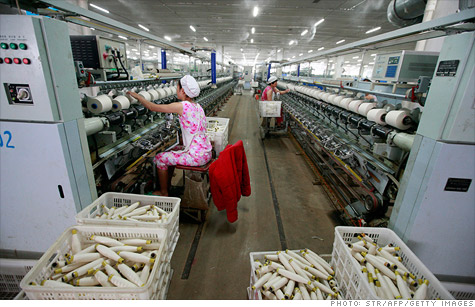Search News

A cotton thread factory in China.
NEW YORK (CNNMoney) -- From China to Germany to the United States, factories that had been bustling with activity are slowing their output -- and raising concerns about a global economic slump.
On Thursday, early readings of purchasing managers in China and Europe showed new signs of slowdowns in manufacturing.
The HSBC survey of Chinese manufacturers found export orders declined at the fastest rate since March 2009, as the overall index fell to a seven-month low.
In Europe, the manufacturing index for June remained at a three-year low, as manufacturing output in Germany -- the most important European economy -- fell at the fastest rate in three years. It was the second straight month of decline.
A 16.6% drop in the Philadelphia Federal Reserve's regional manufacturing index Thursday set off some early alarm bells about U.S. factories as well.
"Certainly it's a flashing amber light, but it's not a red light," said Peter Newland, U.S. economist for Barclays Capital, about the Philadelphia Fed reading.
While many economists agree that overall U.S. manufacturing should continue its nearly three-year run of growth, there are concerns as well. U.S. auto sales slowed to their lowest pace of the year in May and job growth has ground to a near-halt in recent months.
"If I see a large drop in auto sales, I'll get more worried," said Brett Ryan, economist with Deutsche Bank's New York office. "But so far, sales are still above last year's levels." He said even the weak jobs numbers recently show continued growth as well.
The manufacturing slowdown in China can also been seen across other major emerging economies, although the readings are not as current as those reported Thursday. Indexes in Indonesia, Hong Kong and Brazil showed manufacturing in decline in May, while Taiwan was just above the level indicating expansion. Only Indian and Russian manufacturers reported solid growth in manufacturing among the the major emerging economies.
Thursday's reports are partly a sign of the interconnected global economy -- 26% of Chinese exports are bound for Europe, so the sovereign debt and banking crisis that has caused a recession in much of Europe is going to be felt elsewhere in the globe.
But not all of the global slowdown can be hung on the doubts about the future of the euro or worries about Spanish bank bailouts. Economists say there are plenty of local problems around the world causing economies to sputter.
"It's not a surprise to see the slowdown, given that there's a lot of uncertainty about what policy is going to be in all these different regions," said Ryan.
He points out that China is preparing for its first leadership change in a decade, and the People's Bank of China, the central bank, is trying to restart growth through rate cuts and pumping more cash into the economy.
In the United States, there's fear about the so-called "fiscal cliff" that could lead to a higher taxes and lower government spending early next year, as well as doubt about what will be in place after the Supreme Court decision on the health care reform law passed in 2010 -- not to mention the presidential election less than 5 months away.
"All these things keep business leaders on the sideline," he said. "As we move forward, as these issues get resolved one by one, we'll see gradual improvement. But it's just going to take time."
Manufacturing in China, the United States and stronger European countries such as Germany have been important drivers of global economic growth over the last three years. But even that growth hasn't repaired all the damage done by the meltdown of 2008 and 2009, said Mark Williams, chief Asia economist for Capital Economics.
Williams said he believes global growth will weather the current soft patch, just as it did last summer after the first flare-up in the European sovereign debt crisis. The efforts of Chinese authorities to deal with problems in the property market there only add to the drag on global growth.
"We're still in a sense working our way out of the bust of 2008, and the risks, because of what's happening in Europe, are clearly on the downside," he said. "I don't think anybody should be expecting the global economy to return to levels of 2007 anytime soon. It's going to be a long, drawn-out recovery." ![]()
| Overnight Avg Rate | Latest | Change | Last Week |
|---|---|---|---|
| 30 yr fixed | 3.80% | 3.88% | |
| 15 yr fixed | 3.20% | 3.23% | |
| 5/1 ARM | 3.84% | 3.88% | |
| 30 yr refi | 3.82% | 3.93% | |
| 15 yr refi | 3.20% | 3.23% |
Today's featured rates:
| Latest Report | Next Update |
|---|---|
| Home prices | Aug 28 |
| Consumer confidence | Aug 28 |
| GDP | Aug 29 |
| Manufacturing (ISM) | Sept 4 |
| Jobs | Sept 7 |
| Inflation (CPI) | Sept 14 |
| Retail sales | Sept 14 |